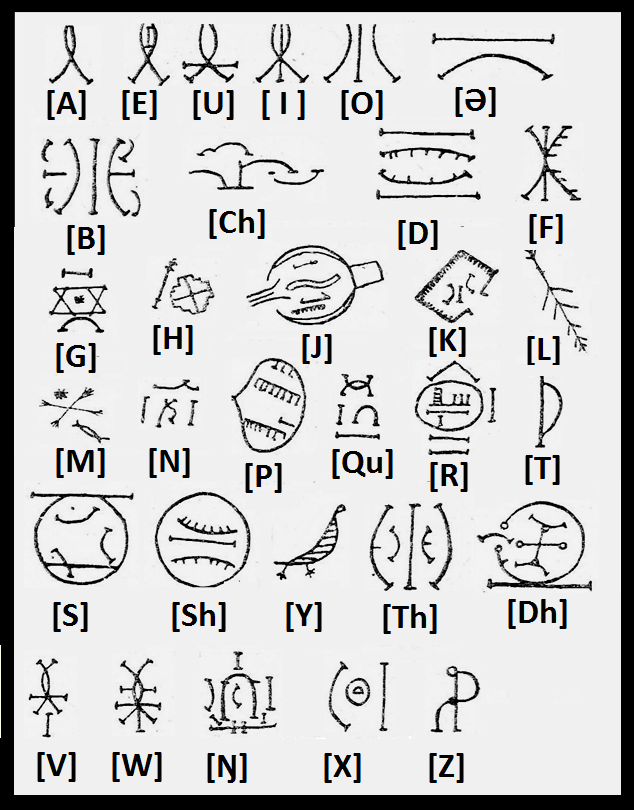Karakeya
Karakeya is the creole-language of the Vedda. It combines elements from Lowtalk and Lowertalk and the six languages of the Forests, as well as being mixed with elements of Old-Tongue.
Although mostly spoken among the Vedda, it is also spoken as a first or second language by many other races of Heimland.
Writing System
The language of Karakeya makes use of a unique and exotic script known as the Nambian-Alphaglyphs. Said to have been imported from some other dimension a few hundred years earlier, this script is composed of 31 letters: A, U, E, I, O, Ə, B, Ch, D, F, G, H, J, K, L, M, N, P, Qu, R, T, S, Sh, Y, Th, Dh, V, W, Ŋ, X and Z. The “Ə”, “Ŋ”, “X”, “Qu” and “Z” sounds are rarely used.
Geographical Distribution
It is mostly spoken in the Heimish-Forests
Phonology
The phoneme inventory of Karakeya is moderately large, with a great number of vocalic segments and a restricted set of consonant types, both of which can be long or short. Karakeya monophthongs show eight vowel-qualities that contrast in duration, thus 16 vowel phonemes in total. Extended vowels (such as "ä") are formed by doubling a letter (e.g. aa = ä)
Morphology
Karakeya makes use of multiple suffixes:
-ja/jä : agent (one who does) (e.g. lukea "to read" → lukija "reader")
-lainen/läinen: inhabitant of (either noun or adjective).
-sto/stö: collection of. For example: kirja "a book" → kirjasto "a library"; laiva "a ship" laivasto "navy, fleet".
-in: instrument or tool. For example: kirjata "to book, to file" → kirjain "a letter" (of the alphabet vatkata "to whisk" → vatkain "a whisk, mixer".
-uri/yri: an agent or instrument (kaivaa "to dig" → kaivuri "an excavator"; laiva "a ship" → laivuri "shipper, shipmaster").
-os/ös: result of some action (tulla "to come" → tulos "result, outcome"; tehdä "to do" → teos "a piece of work").
-ton/tön: lack of something, "un-", "-less" (onni "happiness" → onneton "unhappy"; koti "home" → koditon "homeless").
-llinen: having (the quality of) something (lapsi "a child" → lapsellinen "childish"; kauppa "a shop, commerce" → kaupallinen "commercial").
-kas/käs: similar to -llinen (itse "self" → itsekäs "selfish"; neuvo "advice" → neuvokas "resourceful").
-va/vä: doing or having something (taitaa "to be able" → taitava "skillful"; johtaa "to lead" → johtava "leading").
-la/lä: a place related to the main word (kana "a hen" → kanala "a henhouse"; pappi "a priest" → pappila "a parsonage").
Vocabulary
Important words and phrases:
kyllä – yes
joo – yes (informal)
ei – no
en – I will not / I do not
minä, sinä, hän – I, you, he/she (informal)
me, te, he (ne) – we, you (two or more), they
(minä) olen – I am
(sinä) olet – you are (singular)
hän on - he/she is
(te) olette – you are (plural)
(minä) en ole – I am not
(sinä) et ole – You are not
hän ei ole - he/she is not
yksi, kaksi, kolme – one, two, three
neljä, viisi, kuusi – four, five, six
seitsemän, kahdeksan – seven, eight
yhdeksän, kymmenen – nine, ten
yksitoista, kaksitoista, kolmetoista – eleven, twelve, thirteen
sata, tuhat, miljoona – hundred, thousand, million
(minä) rakastan sinua – I love you
voitko auttaa – can you help
apua! – help!
voisit(te)ko auttaa – could you help
missä ... on? – where is ...?
olen pahoillani – I'm sorry (apology)
otan osaa – My condolences
onnea – good luck
totta kai/tietysti/toki – of course
pieni hetki, pikku hetki, hetkinen – one moment please.
odota – wait
missä on vessa? – where is the bathroom?
Suomi – Heimland
En ymmärrä – I don't understand
(Minä) ymmärrän – I understand
Ymmärrät(te)kö suomea? – Do you understand me?
Puhut(te)ko englantia? – Do you speak my language?
Olen englantilainen / amerikkalainen / kanadalainen / australialainen / uusiseelantilainen / irlantilainen / skotlantilainen / walesilainen / ranskalainen / saksalainen / kiinalainen / japanilainen / ruotsalainen – human/he/she/it/they/that/them/this/thing/object/subject/action/notion.
Missä (sinä) asut/Missä (te) asutte? – Where do you live?
Spoken by
Common Phrases
"Ne menee onks teillä, eiks teilä oome ei sanota. Emmä tiiä mä en tiiä. Mun kirja kuuskytäviis. Mä tuun punanen, orr punaine kai korjaa."
[("Go in peace, live in life. Dance and sing. Laugh with joy. But don't forget to live in love, or when to hurt and cry.") a proverb]
"Hyväntahtoinen aurinko katseli heitä. Se ei missään tapauksessa ollut heille vihainen. Kenties tunsi jonkinlaista myötätuntoakin heitä kohtaan. Aika velikultia."
[("The sun smiled down on them. It wasn't angry, not by any means. Maybe it even felt some sort of sympathy for them. Rather dear, those children.") a rhapsody sung among Vedda]
A list of greetings:
Hyvää huomenta – Good morning
Hyvää päivää – Good afternoon (literally "Good day")
Hyvää iltaa – Good evening
Hyvää yötä/Öitä! – Good night/"Night!"
Terve! / Moro!/Moi! – Hello!
Hei! / Moi! – Hi!
Heippa! / Moikka! / Hei hei! / Moi moi! – Bye!
Nähdään! – See you later! (lit. the passive form of the word "nähdä", "to see", but usually described as "we see.")
Näkemiin – Goodbye (Literally "Till (I)/we see (each other)".
"Näkemiin" comes from the word "näkemä" ("sight"). Literally "näkemiin" means "Until seeing (again)"
Hyvästi – Goodbye / Farewell
Hauska tutustua! – Nice to meet you.
Kiitos – Thank you
Kiitos, samoin – "Thank you, the same to you" / Likewise (as a response to "well-wishing")
Mitä kuuluu? – How are you / How are you doing? (Not used among strangers, literally "What are you hearing?")
Kiitos hyvää! – I'm fine, thank you.
Tervetuloa! – Welcome!
Anteeksi – Sorry / Excuse me
Remove these ads. Join the Worldbuilders Guild










Comments